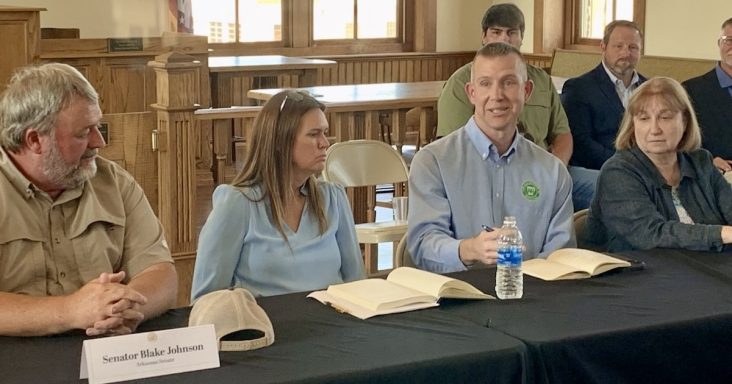Farmers share concerns, call for action at governor’s roundtable
by June 9, 2025 7:28 pm 1,037 views

Arkansas’ agriculture economy is in peril and Gov. Sarah Sanders wants to better understand the plight of farmers firsthand. The governor held a roundtable discussion with farmers, businessmen, elected officials and stakeholders Monday (June 9) in Paragould.
“When you sit down with people in the middle of it, you learn a lot more,” she said.
One of the clearest threats to the state’s agriculture sector is China, she said. Syngenta, a Chinese government owned company, was forced to sell 160 acres of land it owned in Craighead County.
“I think it’s good to get China off our farmland,” said Sanders.
Commodity prices have been in the doldrums the last several years and it’s getting worse, State Sen. Blake Johnson, R-Corning, said. He noted that just a few years ago soybeans were selling at more than $15 a bushel and that number dropped to a little more than $10 a bushel last year. Currently, the commodity trades at about $9.79 a bushel.
Rice is in a similar situation. Prices for the crop are down more than 25% when compared to a couple of years ago, and the trend isn’t changing, he said.
Unrelenting rains have stymied farmers from planting their crops this spring. One farmer noted that crop insurance for each crop has a deadline, and no crop so far has been fully in the ground when the deadline expired meaning anything planted after the deadline cannot be insured. Johnson said that after the rains recently ceased, he planted 700 acres in four days along with replanting another 120 acres.
Since 2018 when President Donald Trump started his tariff war with China, the largest soybean importer in the world, it has tried to find other ways to secure beans to feed its livestock. The country has targeted Brazil as its new supplier, Agriculture Council of Arkansas Vice President Andrew Grobmyer said.
In 2000, the country produced 40 metric tons of soybeans, and that number ballooned to 140 million metric tons last year, making it the largest soybean producer in the world. China is investing in infrastructure around the Pacific Ocean building deep water ports, clearing forest land and building rail lines.
Farmer Brad Doyle said in the last several years Brazil has cleared 11 million acres to grow more soybeans. They have two growing seasons and the country continues to slash forest acres, he said.
Johnson said Americans spend money to develop new soybean technologies and the Brazilians steal it meaning they have little or no research or development costs. Any new trade agreements have to address this issue, he said.
Doyle told the governor and other stakeholders there has been an attempt to expand into other markets such as India and Africa, but those efforts have been slow moving.
One problem he thinks the state could solve is better marketing itself in foreign countries. Delegations from other countries infrequently visit Arkansas farms and that needs to change, he added. A lot of people don’t know that some of the highest protein soybeans produced anywhere in the world are grown in Arkansas, he said.
A fix for what ails parts of the farm community would be the passage of a new federal Farm Bill. The current bill was passed in 2018, and the reference price points for row crop commodities in that bill are from 2012.
Grobmyer said parts of the Farm Bill are included in the new budget reconciliation act that recently passed through the U.S. House and is now under consideration in the Senate. He said he’s hopeful the farm-aid elements of the bill will be accepted by both chambers and once that bill is passed, they can turn their full attention to passing a completely new Farm Bill.
Retail fluctuations impact American farmers, but they have little impact on many farmers in other countries such as China, Johnson said. Other governments like China can simply manipulate their currency or take other actions to stabilize their local farm economies. U.S. farmers are at the mercy of retail and open markets, he added.
“We’re competing on unlevel ground,” he said.
